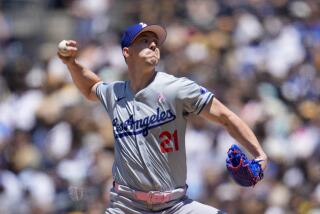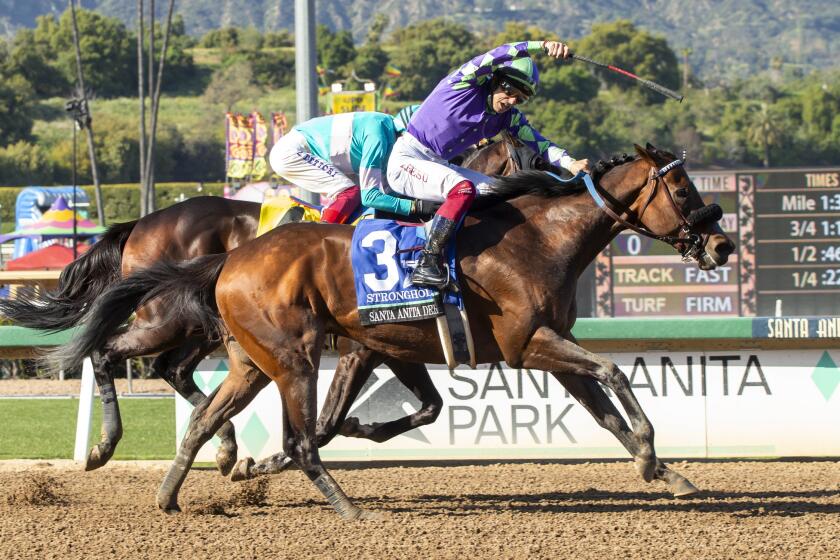Third Man In Ready for Battle
Dodger pitcher Johnny Podres had Sandy Koufax and Don Drysdale in the 1963 World Series. Boston Brave pitcher Bill Voiselle had Warren Spahn and Johnny Sain in the 1948 World Series. Arizona Diamondback pitcher Brian Anderson has Curt Schilling and Randy Johnson in the 2001 World Series.
“They’re a tough act to follow,” said Anderson, the left-hander who will oppose New York Yankee ace Roger Clemens tonight in Game 3 with a chance to turn the Diamondbacks’ 2-0 series edge into a commanding 3-0 lead. “Curt and Randy are so overpowering, and what they’ve done this year is amazing....
“Most people don’t even realize we have other pitchers here, but that’s what happens when you have two guys on the same staff who win 22 and 21 games. You win four games during the year, you don’t expect anyone to know who you are. It’s great for them, but it doesn’t bother me. I’m just one of the extras, the key grip, somebody who fills out the team picture.”
And the World Series rotation. Schilling and Johnson have been the primary focus of this series, and both have been dominant, Schilling limiting the Yankees to one run on three hits in seven innings of a 9-1 Game 1 victory and Johnson throwing a complete-game three-hitter with 11 strikeouts in a 4-0 Game 2 victory.
But Arizona Manager Bob Brenly cannot employ a two-man rotation, so he will turn tonight to Anderson, the affable and outgoing left-hander whose self-deprecating sense of humor and thick skin could be just the antidote for a rabid Yankee Stadium crowd.
“I get to be the lab rat, the guy who pitches the first game in Yankee Stadium and sees how the crowd is,” said Anderson, a former Angel and Cleveland Indian pitcher who is no stranger to Yankee Stadium’s unique setting.
“I remember that stadium and all the wonderfully nice things people in New York would say to me as I got ready.... The fans there are like none other. I love going into New York because they are--they can be obnoxious. They may be mean, but they’re witty. They come up with funny things, a slam on you or your family, but you don’t want them to see you laughing at it because you’re supposed to be getting locked in for a game.”
Merely warming up before a game will be something of a new experience for Anderson, who went 4-9 with a 5.20 earned-run average this season. There has been much speculation whether Brenly will bring back Schilling on three days rest to start Game 4 Wednesday night, but Anderson will be starting on 52 days rest.
He has not started a game since Sept. 8, when he gave up five runs on five hits in 22/3 innings of an 8-6 win over San Diego. Nagging injuries slowed Anderson early in the season, but lagging performance earned him a demotion to the bullpen in September.
Anderson pitched in relief the rest of the season, but a 31/3-inning, one-run, four-hit effort in an 11-4 victory over Atlanta in Game 4 of the National League championship series pushed Anderson back into Brenly’s good graces.
Still, when Brenly saddled up to Anderson while the Diamondbacks were taking batting practice in Bank One Ballpark last week and told him he’d be starting Game 3, Anderson was shocked.
“I was in the outfield and [Brenly] made a bee-line to me, so I knew it was something important,” Anderson said. “I tensed up, because I wasn’t sure what it was. He looked at me and said, ‘How do you feel about going out with the big boys in Game 3?’ I was so excited inside, but I had to sound cool, so I said, ‘Oh yeah, no problem, coach.’ I didn’t want to do a dance in the outfield and look like a moron. But I was definitely excited.”
Brenly chose Anderson over right-handers Miguel Batista and Albie Lopez because he likes the idea of a left-hander starting against a predominantly left-handed-hitting Yankee lineup in a stadium with a short right-field porch. Anderson also has some positive postseason experience, giving up two runs on seven hits in seven innings of a 1999 division series game against the Mets and going 1-0 with a 1.80 ERA in six playoff relief appearances for Cleveland in 1997.
“He is a very calm, cool and collected pitcher,” Brenly said. “He does not get rattled. I’m not sure why he does not recognize the magnitude sometimes of the games he’s pitching in, but he does not seem to be fazed by the situation.”
Nor will the Yankees be fazed by Anderson. Schilling stuck a forkball in the Yankees in Game 1, and Johnson blew 98-mph fastballs by the Yankees in Game 2, but Anderson’s repertoire can’t compare to the Arizona aces. He’s more of a finesse pitcher who must change speeds and locate his pitches.
After Schilling and Johnson, Anderson will seem as inviting to the Yankees as a cool stream to a guy wandering through the desert. New York has not scored a run in 17 innings. Since Bernie Williams’ RBI double off Schilling in the first inning of Game 1, the Yankees have not had a runner reach third base.
The Yankees are batting .102 (6 for 59) and have scored one run. Perpetual playoff hero Derek Jeter (0 for 7) and leadoff batter Chuck Knoblauch (0 for 8) are batting .000. But they have also been in this predicament before, erasing 2-0 deficits to win the 1996 World Series against the Braves and the 2001 division series against the Oakland Athletics.
“They’re still standing,” Arizona first baseman Mark Grace said. “We saw what they did to Oakland, and we watched them against the Braves.
“All we’ve done is win two games. Now we have to come to their yard, where things get more difficult, and we get to face a first-ballot Hall of Famer [in Clemens]. So we’re not overconfident.”
More to Read
Get our high school sports newsletter
Prep Rally is devoted to the SoCal high school sports experience, bringing you scores, stories and a behind-the-scenes look at what makes prep sports so popular.
You may occasionally receive promotional content from the Los Angeles Times.







